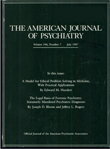Prediction of low body weight at long-term follow-up in acute anorexia nervosa by low body weight at referral
Abstract
OBJECTIVE: The authors investigated the hypothesis that in acute anorexia nervosa a low body weight predicts a poor weight prognosis for the future. METHOD: The body mass indexes at referral of 272 female patients were examined in relation to the body mass indexes of these patients after a mean follow-up of 9.5 years. RESULTS: The overall correlation between body mass indexes at referral and at follow-up was r = 0.33. Despite this low correlation, the 100 patients with body mass indexes less than 13 kg/m2 at referral had low weights at long-term follow-up. Eleven of the 12 deceased patients were among these 100 patients, as were 24 of the 46 surviving patients whose body mass indexes were 17.5 kg/m2 or less at follow-up. CONCLUSIONS: For patients with anorexia nervosa, a body mass index less than 13 kg/m2 at referral indicates a substantial risk for chronic anorexia nervosa and death related to emaciation.



